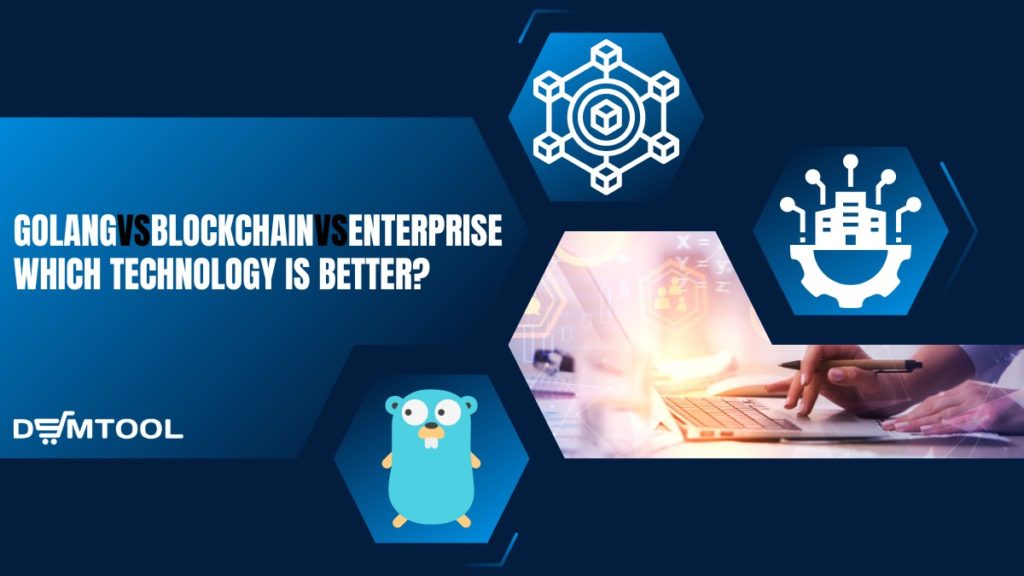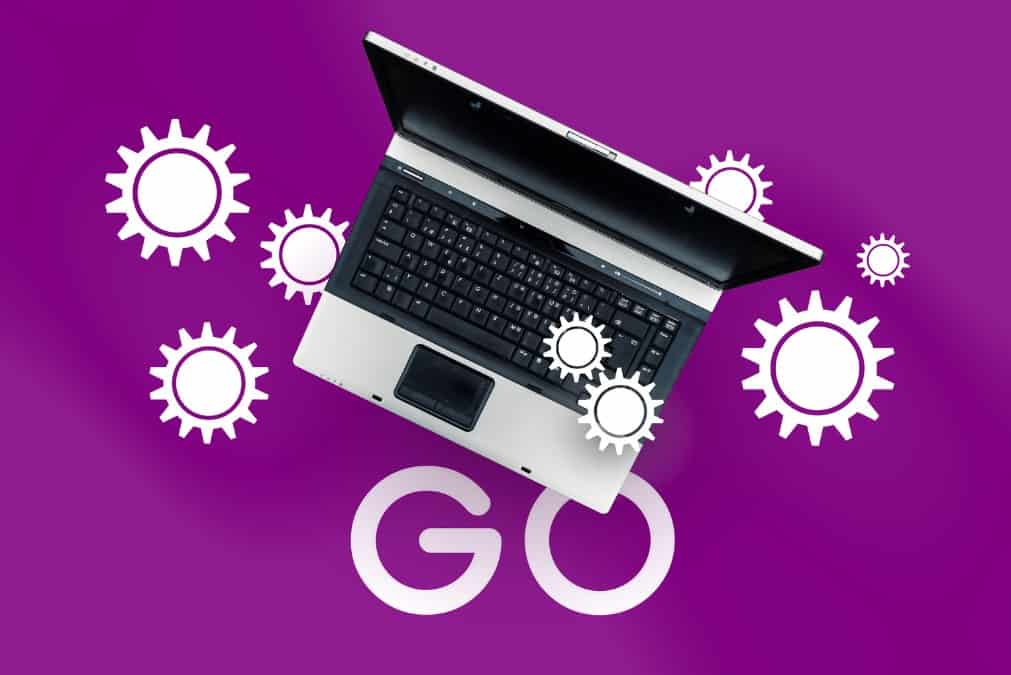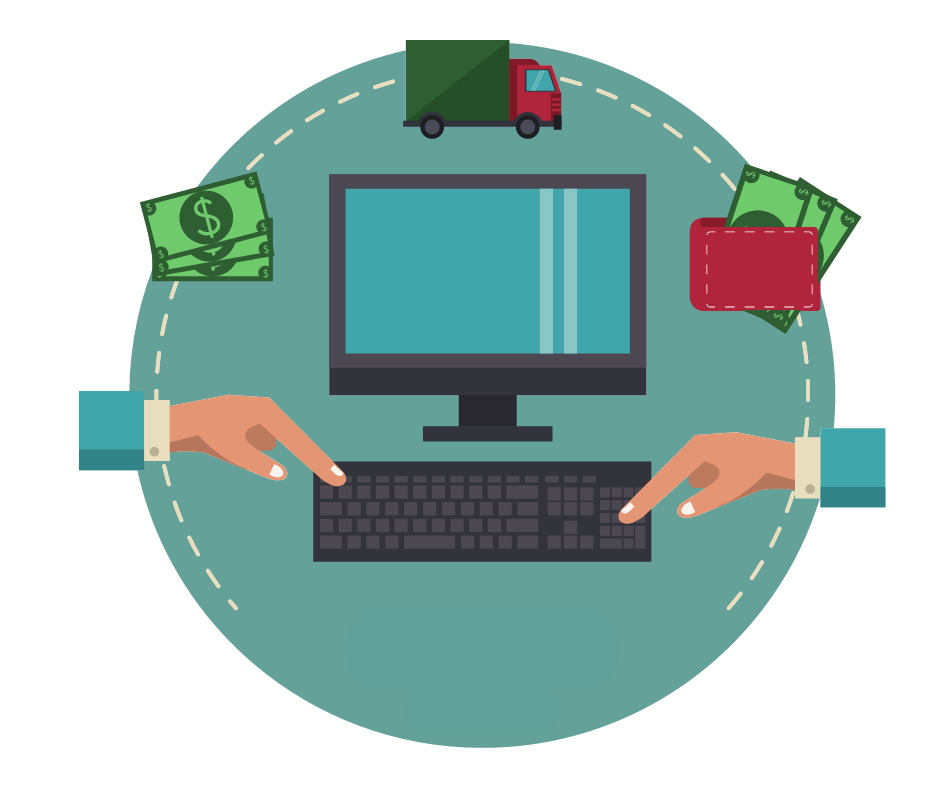
As we continue to watch the evolving technology landscape, it can be difficult to keep up with the various trends and technologies that emerge. From Golang and blockchain to enterprise support systems, there’s certainly no shortage of options when it comes to designing software solutions. But which one should you choose?
In this article, we’ll take a deep dive into each of these three technologies and compare them to determine which is best suited for your use case. So whether you’re an experienced software developer or just getting started on your coding journey, this article will provide valuable insights so you can make an educated decision when selecting the right tech stack for your project.
Golang vs Blockchain vs Enterprise: Overview
Golang
Golang (also known as Go) is an open-source programming language developed by Google in 2009. It was designed to support distributed systems and large-scale applications, including those used in cloud computing environments. Go is more concise than Java and C++, making it easier to read and write code quickly. Additionally, its scalability makes it perfect for building powerful APIs and consumer-facing web applications.
Blockchain
Blockchain is an immutable distributed ledger technology that enables secure digital transactions without the need for intermediaries such as banks or government entities. By removing middlemen from the equation, blockchain technology can reduce costs associated with traditional banking infrastructure and simplify payment processing for business transactions. It also offers users greater control over their data since the information stored on the blockchain cannot be modified or deleted without permission from all parties involved.
Enterprise Technologies
Enterprise technologies are designed specifically for large organizations or companies that need reliable solutions that can handle complex tasks quickly and efficiently with minimal risk involved. These solutions often involve enterprise resource planning (ERP) systems which allow companies to manage their operations from one central location without having to manually enter data every time something changes or needs updating. ERPs also help reduce overhead costs by streamlining processes such as billing and accounting as well as improving communication between departments within an organization.
Do you know that businesses can take advantage of B2B cashback? Learn more in our guide on How to reduce your business spending with B2B cashback.
Advantages and Disadvantages of Each Technology
Golang: Pros and Cons

The pros of Golang:
- Easy syntax: The code structure in Golang is simple, which makes it easier for developers to read, understand and debug their code quickly. This enables developers to write more efficient code without worrying about syntax errors.
- Speed and performance: Golang is a compiled language so it runs faster than other languages like Python or JavaScript. It can be used for large projects because it can handle high volumes of data quickly, making it great for scalability.
- Multi-platform support: The language supports multiple platforms including Windows, Mac OSX, Linux, and others. This makes it easier for developers to deploy applications across different platforms without having to rewrite their code.
Cons of GoLang:
- Limited library support: The library support in Golang is limited compared to other languages such as Python or JavaScript which have hundreds of libraries available for use by developers. This can make development time longer as developers will need to create custom libraries or search for existing ones that meet their needs.
- Lack of tools and frameworks: Unlike other languages such as Ruby on Rails or Django which have a wide array of tools and frameworks available for rapid development, technology does not have many tools available yet which can make development time longer than expected.
- Difficult error handling: Error handling in Golang can be difficult due to its strict type-checking system which requires all types of variables (strings, integers) to be explicitly declared before they can be used in code. You will most likely need expert remote support to handle errors efficiently.
Blockchain: Pros and Cons

The pros of blockchain technology
- Increased security: One of the biggest advantages of blockchain technology is its security. The data stored in a blockchain is encrypted with cryptography which makes it extremely difficult to crack or hack into. This means that your data will be secure from any malicious third-party actors who might want to access it without permission.
- Transparency: Another major benefit of blockchain technology is its level of transparency. All transactions are recorded on a distributed ledger, meaning that everyone involved in the process can see exactly what’s going on at any given time.
- Speed: Using blockchain technology can significantly speed up business processes by eliminating middlemen and reducing paperwork, which can be tedious and often slow things down considerably.
The cons of blockchain technology:
- Cost: The costs associated with setting up a secure network are quite high, so this may not be feasible for smaller businesses or those just starting who don’t have access to large amounts of capital upfront.
- Scalability: All transactions must be verified by every node in the network (which could potentially include hundreds or thousands of computers), larger networks may experience slower speeds as more nodes are added to the system which could cause delays in processing times for transactions.
- Difficulty updating systems: It can be difficult to make changes or updates to existing systems without disrupting the entire network itself — something which could lead to costly mistakes if not done properly.
When companies decide to expand the scale of their business or go global, they can’t pull it off without engaging in international marketing. Here are 5 Strategies for International Marketing for Your Business Online.
Enterprise: Pros and Cons

Pros of enterprise:
- Scalability: With enterprise application development services, you can scale up or down depending on your changing needs without having to invest in additional hardware or software. This makes it easy for businesses to adjust their operations when their demands change or grow without having to take on extra overhead costs.
- Security: When you outsource your development needs, you can benefit from the security measures that these companies have in place for their customers. Many enterprise application development providers use encryption technologies and other security protocols that keep your data safe from hackers and other cybercriminals who may try to access it illegally.
- Cost savings: Enterprise can save you money in the long run by reducing labor costs associated with manual tasks or processes that are now automated through software or applications. These savings can be reinvested into other areas of your organization or put towards other projects such as marketing or research and development efforts that could benefit from additional funds.
Cons of Enterprise:
- Upfront costs: Developing custom applications takes time and money which may not be feasible for some businesses depending on their budget or timeline constraints. Additionally, if the project fails due to unforeseen issues, even more money could be lost in the process, so it’s important to weigh all options before committing resources to this type of project.
- Maintenance requirements: Once an enterprise application has been developed, there is often ongoing maintenance that needs to be performed for it to continue operating correctly over time. This means additional costs, such as hiring IT staff who specialize in software maintenance or investing in bug fixes as they arise over time which can add up quickly if not managed properly from the start of the project onwards.
What is Blockchain in Marketing?

You might think that blockchain is something for IT companies or relates to cryptocurrencies only, but this is not true. Blockchain is a technology. And as with most technologies, it can be applied to different online businesses: eCommerce and dropshipping, digital marketing, and even advertisement.
Blockchain Marketing
Marketing is not new – getting people interested in something is just as old as the trade. Many studies found evidence of advertising, branding, packaging, and labeling in antiquity. Just as societies evolve, so does marketing: new problems require new solutions. As the marketing industry grows, so do challenges and inefficiencies. It is a constant adaptation to new trends, world changes, and technologies.
While blockchain is used almost exclusively for cryptocurrencies (buying, selling, and trading), it is a new trend in marketing that solves some of its latest challenges, like advertising fraud. It offers a simple solution to this challenge with real-time data aggregation of its decentralized ledger technology and cost-saving transparency. With blockchain technology advancing, it has several other beneficial uses for marketing, such as building customer loyalty programs and facilitating contract trading. By allowing businesses to design more targeted advertisements without a need to share so much of customers’ data with so many companies, blockchain marketing creates more secure relationships between brands and their customers.
Here are some of the blockchain application cases in digital marketing:
Keyword Tracking
Google and other search engines show results based on a user’s location, the device a user uses, etc. Because of that, what a user sees is often unique to them. This is good for users because they get results tailored for them, but this also makes it harder for marketers to track keyword ranking.
If integrated into search, blockchain can store page rankings and location with device usage data with the ranking position. It will allow marketers to improve results in areas and on devices where they are underperforming.
Influencer Marketing
Contextual marketing is at its peak of popularity: brands invest heavily in micro-influencers and celebrities to reach specific segments or get wider audiences. Despite all the benefits, contextual marketing has serious drawbacks, like a lack of transparency, fake followers, and ROI tracking difficulties. By integrating smart contracts and decentralized tools, blockchain marketing can effectively solve these problems.
Influencer marketing has become one of the most prolific forms of digital marketing in recent years. Learn How to Find Social Media Influencers for Your Product.
Affiliate Programs
Affiliate marketing suffers such problems as dealing with shady affiliates, wasting money on sites that bring no value, and paying commissions to affiliate networks. Blockchain marketing can overcome these issues by simplifying the payment process with cryptocurrencies, reducing ad fraud, and ensuring accountability by implementing smart contracts. Another perk is that, when using blockchain technology, affiliate networks no longer withhold payouts until users exceed a minimum threshold.
When it comes to improving lead generation, there are many benefits associated with affiliate marketing. Find out the best Ways to Improve Lead Generation in Affiliate Marketing.
Loyalty Programs
Whether to get discounts or because of loyalty to brands, many shoppers join multiple loyalty programs. One of the main problems of loyalty programs arises when users redeem their loyalty points. It is simple to do when you joined one or two programs, but what if you joined more than ten or twenty? How to keep track of all the rewards before they expire?
Blockchain marketing can solve this problem by introducing a decentralized system in which customers are allowed to redeem loyalty points with any brand within the system.
Transparent Marketing
Transparency and authenticity are vital for brands that focus on millennials and Gen Zers. Brands try to use support for causes such as fair trade and environmental issues in their marketing and advertising efforts. But can they prove it? Not all brands are 100% transparent about what is going on behind the scenes, so, understandably, customers have doubts regarding marketing campaigns and advertisements.
Because blockchain provides transparency, and its immutability means it can be trusted. Brands can take advantage of this to prove their supply chain process and gain customers’ trust and loyalty.
These are just a few cases of what could be achieved by using blockchain in marketing. Its decentralized ledger technology helps marketers to manage customers’ data more efficiently, gain better insights into audience interactions, and build trustworthy relationships between brands and their customers. With further development of blockchain technology, we will see more and more of its appliance in eCommerce and digital marketing.

Not yet making money online?
Start your own dropshipping business. Sign up for a free trial of DSM Tool and we’ll help you get started. Today is the day.
Conclusion
Golang vs Blockchain vs Enterprise. Each technology has its own merits and drawbacks depending on your business needs — and understanding those differences can be key when deciding which solution will best serve your company’s goals. Golang offers superior performance and scalability while blockchain provides increased data security within distributed networks. Meanwhile, enterprise software can increase productivity by allowing companies to customize their processes according to their specific needs.
Ultimately, choosing the right technology comes down to understanding your objectives and determining which solution will best meet them — and no matter what path you choose, you can rest assured that you’re selecting from some of the most powerful tools available today.

